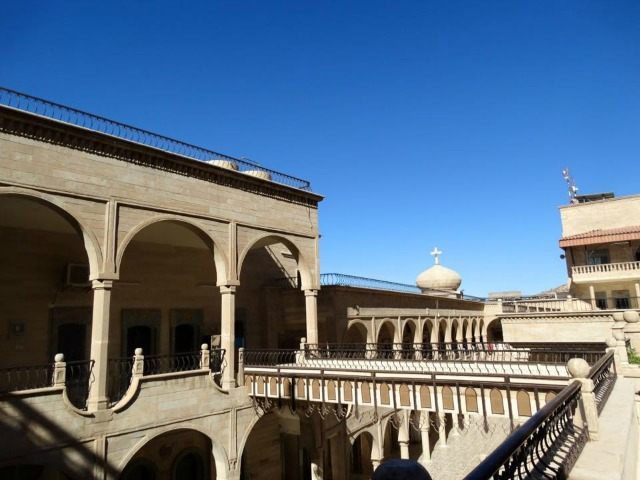Mar Mattai, also known as Saint Matthew monastery, sits only 12 miles from Mosul, Iraq, but it provides shelter for numerous Christians who fled persecution from the Islamic State (ISIS/ISIL).
The 1,600-year-old building housed the residents when ISIS captured the city in June 2014. Unfortunately, not many remain.
“They’ve gone to Irbil and Dohuk,” truck driver Faris Sabah, 51, told Stars and Stripes.
Sabah still lives at the monastery with his family, but he hopes to move them “to a place where there are other Christians.” They often look down at Mosul at night, witnessing the few lights that remain after it lost its main power line. ISIS might only be a few miles away, but they do not “feel fear.”
“My God will protect me,” declared his wife Yonan.
A special unit of Peshmerga Kurdish fighters protect Mar Mattai from ISIS.
The hermit Matthew founded the monastery in 361 after he fled into the mountains to escape persecution under the Roman Empire. One day, Prince Behnam met the hermit while hunting. Matthew impressed the prince, who persuaded his mother to take his ill sister to the man for healing. After Matthew cured Sarah, he baptized the siblings. The king ordered death sentences for his children, but contracted a life-threatening illness right after they died. Behnam’s spirit told his mother to take the king to Matthew. She obeyed, and he cured the king, who then built the monks a stronger monastery to say thank you.
Sennacherib built the Mar Behnam Catholic monastery on the location where Mar Mattei healed Sarah. However, ISIS destroyed that monastery in March 2015.
Mar Mattai is well known for its library, especially the Syriac Christian manuscripts. Christians convene at the monastery every September 18, the day Mar Mattai died.
But now the vibrant building is mostly bare due to ISIS. Jihadists consider it part of their mission to erase history and wipe Christianity off the map. They proudly post pictures and videos of themselves destroying books and manuscripts. The valuable writings inside Mar Mattai, including letters of St. Paul, reside in Dohuk. They already removed historic and priceless items from the building, including “the tomb of the monastery’s namesake, St. Matthew.” Officials moved St. Matthew’s bones “north into relatively safe territory of the Kurdish Regional Government.”
Syrian Orthodox seminary student Bosman Sofia, 28, is one of the few clergy who remained behind.
“Every day more people go,” he said.
But the monks do not fear ISIS, much like the Christians they shelter. News outlets interviewed the residents in May and June of this year.
“We are not scared, because our teachers give us a feeling of peace here, but we know we are on the frontlines, and in seconds the Islamic State could be here,” maintained student Sahar Karaikos. “I don’t even want to think or speak about the destruction the Islamic State would cause if they took our monastery.”
“We can see the battles and the air strikes from here in front of us, especially at night,” said head monk Yousif Ibrahim. “The sky lights up at night, but we of course are not scared. God protects us.”
Ibrahim said he will only leave when the last Christian departs Iraq. Karaikos hopes the remaining Christians stay in Iraq “to preserve their history.”
“Saint Matthew ended up here because he was fleeing persecution, but persecution follows us,” said Karaikos. “We can’t run from it, we have to stand in front of our history.”

COMMENTS
Please let us know if you're having issues with commenting.